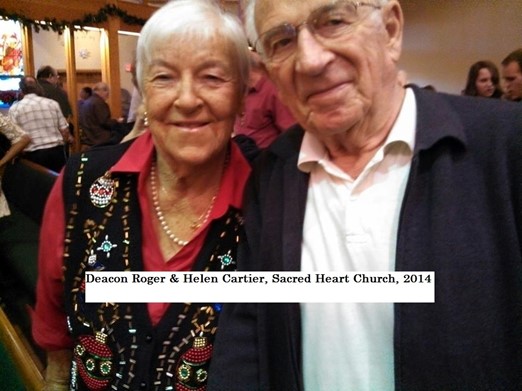A Mirror of Christmas: the Happily Married Couple
Honoring Traditional Marriage during the Christmas Season
Joseph and Mary set the standard for married couples. This is about a couple who did their best to meet that standard. There are many more like them. No couple can compare to Joseph and Mary, but many do try to follow their example. This couple did for 68 years.
St. John Paul II said, “Marriage is an act of will that signifies and involves a mutual gift, which unites the spouses and binds them to their eternal souls, with whom they make up a sole family, a domestic church.”
The sainted Holy Father was referring to people like Roger and Helena when he made that statement. That is because this couple did, in fact, create a domestic church when they took their marriage vows so long ago. These two people, this man, and woman are a Catholic love story not only for today but for all time. They made the ultimate commitment to each other, emptied themselves for each other, and never looked back.
I am using them as examples of the countless couples like them, past and present, who have also joined together to create “domestic churches.” These domestic churches that supported their love were built on the cornerstone we know as faith; faith in Jesus Christ. And it was Jesus who was the cornerstone of the first domestic church, which included Mary and Joseph.
Spread across the landscape of our society are many well-springs of marriage and family. These homes have one predominant thing in common. God is the essence and focal point of their lives. Roger and Helena were the patriarch and matriarch of one of those families.

The family is the nucleus of any society
Of course, we all know that many marriages have not worked out. But this essay is not about failed marriages. This is about the millions of marriages that have stood the test of time and became domestic churches. Sadly, secularism has convinced many the world over that marriage is what “you” want it to be, with whomever you want to be. It also proclaims that those of the Judeo-Christian faith are intolerant and have NO love in their cold hardened hearts for diversity. This secularistic atmosphere has cut deeply into the very fabric of our society and wounded it severely. That fabric is the family. And the family is the nucleus of any society.
Roger passed away in 2017. He was 91. Helena passed in in 2019 at the age of 90. Roger was a retired letter carrier. He was also an ordained deacon in the Catholic Church. When Roger passed on to his eternal reward, he and Helena had just celebrated their 68th wedding anniversary.
The thought of applying to the permanent diaconate horrified him
The Deacon was a World War II veteran. He was hired by the post office after he and Helena were married. A few years after that, he became quite active in the Knights of Columbus. He rose to the District Deputy’s position giving him oversight of many K of C councils in the Connecticut area. Then his good friend, Father Kuzdal, suggested to Roger that he should apply to the permanent diaconate. Roger was horrified. He believed he was highly unqualified to do this.
What Roger and Helena did not realize at the time was that God had chosen both of them. Just as Mary Magdalene was there to help the apostles, Helena would help her husband in a ministry that required ordination into the Sacrament of Holy Orders. They had embraced themselves with each other’s love and wrapped their Catholicity around it. The “domestic church” they created was what St. John Paul II spoke of.
Deacon Roger told me how close he was to leaving the diaconate program. All the other candidates were college graduates, seemingly well versed in Scripture, and well-spoken. He was sure he had no business being in such lofty company. He went to Father Kuzdal and voiced his concerns. Father looked at him and said, “Roger, you have a quality these other fellas do not have. You are a natural listener. You have a gift. You do belong here.”
The final confirmation came from his partner in love and life, Helena. She agreed with Father Kuzdal, and in 1986, L. Roger Cartier became Deacon L. Roger Cartier. He was ordained in the Diocese of Norwich, CT, and remained there for a year. Then it was on to Pinellas County, Fl, where he served until his retirement from ministry.
Deacon Roger assisted quietly and efficiently over the years, always being there when needed. He was the spiritual director of both The Legion of Mary and the St. Vincent de Paul Society. Roger always donned his Santa outfit for the Christmas parties delighting countless children, and he visited the school frequently, talking to the kids about being Catholic.
He was always available for Stations of the Cross, or Benediction and novenas. Roger visited the funeral homes when folks passed, did internments at the cemetery, and still spent time with the families. He was a constant fixture at the local hospital and nursing homes. He also presided over weddings and performed Baptisms.
The man was a listener. People sought him out specifically for that reason.
The one thing that was most noticeable (at least to me) was the one on one conversations he always seemed to be having with someone. This is where Father Kuzdal, so many years earlier, had profiled Roger Cartier correctly. The man was a listener. People sought him out specifically for that reason. He would look them in their eye and listen.and he would remember to ask them the next time he saw them how things were going with “such and such”: lousy back, a surgery, kids, financial worries, family problems, or whatever it might be. People loved him because they knew he cared about them. He was REAL.

Deacon Roger and his Helena left behind three daughters, nine grandchildren, and 14 great-grandchildren. They had formed a domestic church within our midst, and today it has expanded to over a dozen more domestic churches. It was my honor and privilege to know them. For all those who did not, comfort in the fact that people like Roger and Helena are always among us. Goodness exists and is often part of a domestic church that extends its loving arms to all that may cross its path.
Christmas is about love and giving. A young, happy couple celebrated the first Christmas by greeting their newborn Son. The Cartiers, and those like them, are the reflection of that very first Christmas.
Man and woman are created in God’s image and likeness; and for this reason, marriage likewise becomes an image of God. (Pope Francis: Rome, Italy, May 25, 2018)
Copyright© Larry Peterson 2017, 2022
Image: Pexels



